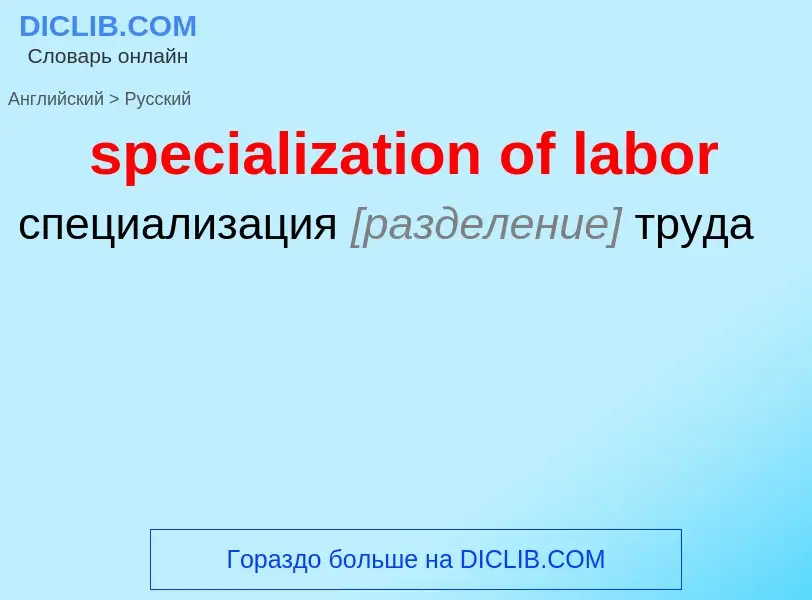Traducción y análisis de palabras por inteligencia artificial ChatGPT
En esta página puede obtener un análisis detallado de una palabra o frase, producido utilizando la mejor tecnología de inteligencia artificial hasta la fecha:
- cómo se usa la palabra
- frecuencia de uso
- se utiliza con más frecuencia en el habla oral o escrita
- opciones de traducción
- ejemplos de uso (varias frases con traducción)
- etimología
specialization of labor - traducción al ruso
общая лексика
разделение труда
Definición
.
Wikipedia
.jpg?width=120)
The division of labour is the separation of the tasks in any economic system or organisation so that participants may specialize (specialization). Individuals, organizations, and nations are endowed with or acquire specialized capabilities, and either form combinations or trade to take advantage of the capabilities of others in addition to their own. Specialized capabilities may include equipment or natural resources as well as skills. Training and combinations of equipment and other assets acting together are often important. For example, an individual may specialize by acquiring tools and the skills to use them effectively just as an organization may specialize by acquiring specialized equipment and hiring or training skilled operators. The division of labour is the motive for trade and the source of economic interdependence.
Historically, an increasing division of labour is associated with the growth of total output and trade, the rise of capitalism, and the increasing complexity of industrialised processes. The concept and implementation of division of labour has been observed in ancient Sumerian (Mesopotamian) culture, where assignment of jobs in some cities coincided with an increase in trade and economic interdependence. Division of labour generally also increases both producer and individual worker productivity.
After the Neolithic Revolution, pastoralism and agriculture led to more reliable and abundant food supplies, which increased the population and led to specialization of labour, including new classes of artisans, warriors, and the development of elites. This specialization was furthered by the process of industrialisation, and Industrial Revolution-era factories. Accordingly, many classical economists as well as some mechanical engineers, such as Charles Babbage, were proponents of division of labour. Also, having workers perform single or limited tasks eliminated the long training period required to train craftsmen, who were replaced with less-paid but more productive unskilled workers.

.jpg?width=200)

![[[Facsimile]] of the first page of du Monceau's introduction to ''Art de l'Épinglier'', with "division de ce travail" highlighted [[Facsimile]] of the first page of du Monceau's introduction to ''Art de l'Épinglier'', with "division de ce travail" highlighted](https://commons.wikimedia.org/wiki/Special:FilePath/Duhamel.jpg?width=200)




.jpg?width=200)

